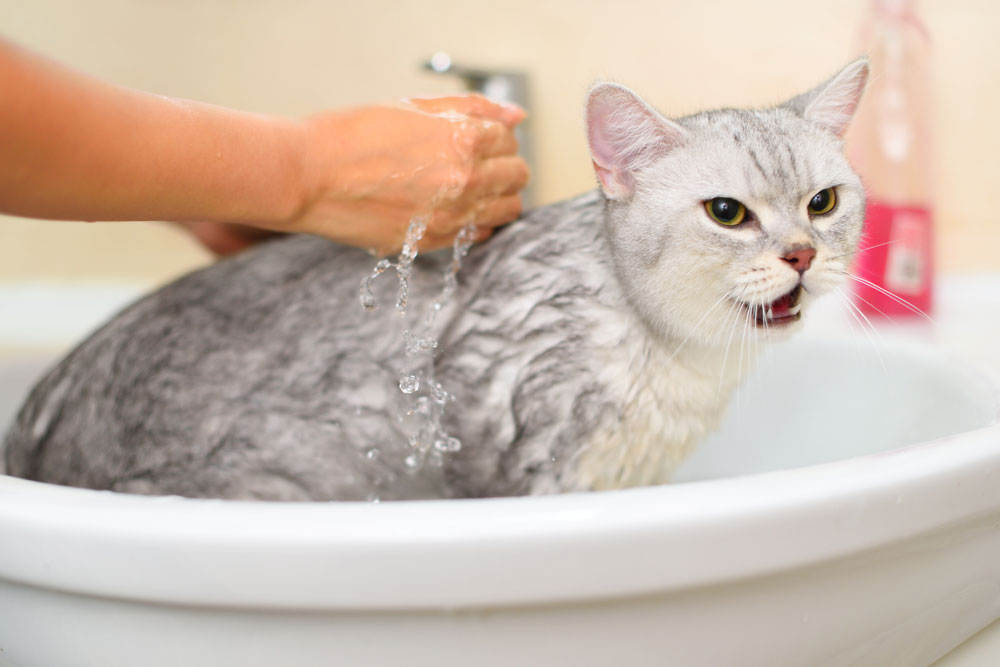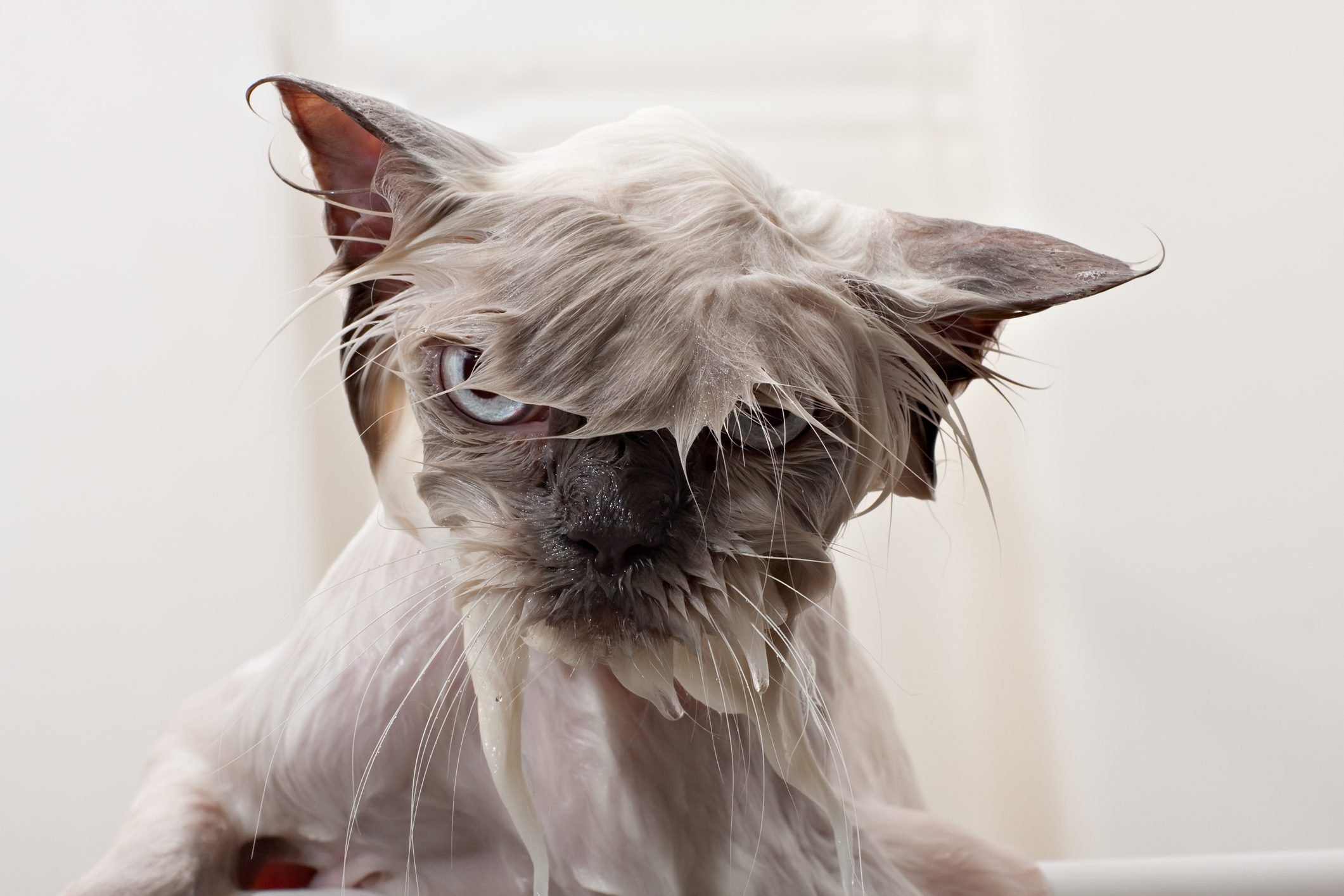Cats generally dislike water. But why is that?
Understanding feline behavior helps answer this question. Cats evolved in dry climates. Their ancestors didn’t need to swim or bathe often. This natural aversion to water is still present in modern cats. Many cats also have a sensitive coat that doesn’t dry quickly.
Wet fur can make them feel uncomfortable and cold. Additionally, cats are meticulous groomers. They prefer to keep their fur clean and dry. These reasons explain why most cats avoid water whenever possible. In this blog, we’ll dive deeper into the reasons behind cats’ dislike for water and explore how you can help your feline friend feel more comfortable around it.

Credit: gilbertsvillevet.com
Natural Instincts
Understanding why cats hate water often leads us to their natural instincts. These instincts have evolved over time, shaping their behaviors. Let’s explore how these instincts influence their aversion to water.
Evolutionary Background
Most domestic cats trace their lineage back to desert-dwelling ancestors. These ancient felines lived in arid regions, where large bodies of water were scarce. Consequently, they didn’t evolve to have a natural affinity for water. This evolutionary background explains why many cats today still avoid it.
Survival Mechanisms
Cats are meticulous groomers. They spend a significant amount of time cleaning their fur. Wet fur can become heavy and uncomfortable, hindering their movement. In the wild, a wet cat would be more vulnerable to predators.
- Wet fur takes longer to dry, making them cold.
- Heavy fur can slow them down.
- Wet fur loses its insulating properties.
Additionally, cats have a strong sense of smell. The scent of water may mask their natural scent, which can be unsettling for them.
These survival mechanisms ensure that cats stay safe and comfortable in their environments. Understanding these instincts helps explain their water aversion.
Sensory Sensitivities
Why do cats hate water? One significant reason is their sensory sensitivities. Cats are sensitive creatures, and their senses play a crucial role in their behavior. Understanding these sensitivities can help explain their aversion to water.
Tactile Sensation
Cats have a heightened sense of touch. Their skin is more sensitive compared to humans. When their fur gets wet, it becomes heavy and uncomfortable. This sensation can be distressing for them. Wet fur clings to their bodies, making them feel restricted. This restriction can cause anxiety and discomfort.
Temperature Sensitivity
Cats are also sensitive to temperature changes. Water often feels cold to them. Even lukewarm water can feel chilly to a cat. Their body temperature is naturally higher than humans. So, they prefer warmth and avoid anything that feels cold. A bath or a splash of water can shock their system.
| Reason | Impact on Cats |
|---|---|
| Tactile Sensation | Wet fur feels heavy and restrictive. |
| Temperature Sensitivity | Water feels cold and uncomfortable. |
Coat And Grooming
Cats have unique coats and grooming habits. These factors play a big role in why they dislike water. Understanding their fur and behavior can explain this aversion.
Water Repellency
A cat’s coat is not water-repellent. Unlike dogs, most cats have fur that absorbs water. This makes their fur heavy and uncomfortable when wet. Wet fur can take a long time to dry, making cats feel cold and uneasy. Cats have an undercoat and topcoat. Water can seep through both layers, reaching the skin. This can make them feel vulnerable and stressed.
Self-cleaning Habits
Cats are known for their self-cleaning habits. They spend a large part of their day grooming. This behavior keeps their coat clean and free of parasites. Cats use their rough tongues to remove dirt and loose fur. They do not need water to stay clean. Grooming is also a relaxing activity for cats. It helps them stay calm and reduces stress. Introducing water disrupts this routine and can cause anxiety.

Credit: www.rd.com
Lack Of Exposure
Cats often dislike water due to a lack of exposure. This can stem from their natural environment or their upbringing. Unlike dogs, cats do not have many opportunities to interact with water. This unfamiliarity can lead to a fear or dislike of water.
Domestication Factors
During the domestication process, cats were not exposed to water regularly. Early domesticated cats lived in arid regions where water was scarce. This lack of exposure carried over to modern cats. As a result, many cats are not accustomed to being in or around water.
Domesticated cats also rely on humans for food and shelter. Unlike wild cats, they do not need to hunt near water sources. This further reduces their interaction with water.
Limited Interaction
Cats have limited interaction with water in their daily lives. Most cats are indoor pets and do not encounter water bodies like rivers or lakes. Their primary experience with water is during baths, which can be stressful.
Bathing can be an unpleasant experience for cats. The sensation of being wet is unfamiliar and uncomfortable for them. This negative experience can reinforce their dislike of water.
Cats also have grooming habits that reduce the need for baths. They clean themselves with their tongues, which helps them stay clean without needing water.
| Reason | Effect on Cats |
|---|---|
| Lack of Exposure | Fear or dislike of water |
| Domestication Factors | Reduced need for water interaction |
| Limited Interaction | Negative experiences with water |
Negative Experiences
Many cats hate water due to negative experiences. These experiences often shape their behavior towards water. Understanding these events can help us empathize with our feline friends.
Traumatic Incidents
Some cats may have faced traumatic incidents involving water. This could include being sprayed with water as a punishment. Or, they might have slipped and fallen into a body of water. Such events can create a lasting fear. It makes them avoid water at all costs.
Stress And Anxiety
Water can also be a source of stress and anxiety for cats. Cats are creatures of habit. They thrive in calm and predictable environments. A sudden splash or being forced into a bath can cause severe stress. This can lead to anxiety whenever they are near water.
Additionally, loud noises associated with water, like running taps or splashes, can startle them. This increases their reluctance to be near water. Stress and anxiety can compound over time, making the aversion stronger.

Credit: ultimatepetnutrition.com
Comparative Animal Behavior
Why do cats hate water? This question often puzzles cat owners. Comparing animal behavior helps to understand this better. Different animals react to water in diverse ways. Let’s explore how other mammals and wild vs. domestic cats behave around water.
Other Mammals
Many mammals enjoy water. For example, dogs often love swimming. They have a strong instinct to paddle and stay afloat. Otters and beavers spend most of their lives in water. Their bodies are adapted to it.
| Mammal | Water Behavior |
|---|---|
| Dog | Enjoys swimming |
| Otter | Lives in water |
| Beaver | Builds dams |
Cats, on the other hand, have a different relationship with water. Unlike dogs, most cats dislike getting wet. Their fur does not dry quickly. Wet fur can make them feel uncomfortable and cold.
Wild Vs. Domestic Cats
Wild cats and domestic cats also differ in their behavior towards water. Wild cats, like tigers, often swim. They use water to cool off and hunt. In contrast, domestic cats usually avoid water.
Domestic cats have ancestors from desert regions. These areas have little water. So, domestic cats did not evolve to like water. Their behavior today reflects this past.
- Wild cats like tigers swim for cooling and hunting.
- Domestic cats avoid water due to their desert ancestry.
Understanding these behaviors can help cat owners. Respect your cat’s dislike for water. It is part of their natural instincts.
Human Influence
Human Influence plays a significant role in why cats dislike water. Our behavior and actions can shape a cat’s perception of water, often leading to aversion. Understanding this influence can help cat owners create a more positive experience with water for their feline friends.
Owner Reactions
How owners react to their cats around water can impact the cat’s feelings. If an owner shows fear or anxiety, the cat might sense it and become wary.
Positive reinforcement is crucial. Cats respond well to calm and gentle approaches. Avoid sudden movements or loud noises when introducing your cat to water.
Consider the following tips:
- Speak softly and reassuringly.
- Use treats to create a positive association.
- Stay calm and patient throughout the process.
Training Techniques
Training your cat to be comfortable with water requires patience and consistency. Start with small steps and gradually increase exposure.
Here are some effective training techniques:
- Introduce your cat to water gradually. Begin with a damp cloth.
- Let your cat play with water in a shallow dish.
- Use toys to create a fun and engaging experience.
- Reward your cat with treats and praise.
Using a step-by-step approach can make a significant difference. Ensure each step is a positive experience for your cat. This method reduces fear and builds confidence.
Understanding the human influence on a cat’s behavior around water is essential. By adjusting owner reactions and applying effective training techniques, you can help your cat feel more comfortable and less fearful of water.
Coping Strategies
Cats are known for their aversion to water. But with the right coping strategies, you can help your furry friend become more comfortable. In this section, we’ll explore some effective techniques to ease your cat’s fear of water.
Introducing Water Gradually
Start by introducing your cat to water slowly. Use a shallow dish with a small amount of water. Let your cat investigate at their own pace. Gradually, increase the water level as your cat becomes more comfortable.
| Step | Action |
|---|---|
| Step 1 | Place a shallow dish of water nearby. |
| Step 2 | Let your cat explore the dish on their own. |
| Step 3 | Increase water level gradually over time. |
Creating Positive Associations
Creating positive associations with water can help reduce your cat’s fear. Offer treats or toys near the water dish. Praise your cat when they show curiosity. You can also use a damp cloth to gently wipe your cat, mimicking the sensation of water.
- Offer treats or toys near the water.
- Praise your cat for being curious.
- Use a damp cloth to wipe your cat gently.
Using these simple strategies, you can help your cat feel more at ease around water. Remember to be patient and consistent. Over time, your cat may become less fearful and more relaxed.
Frequently Asked Questions
Why Do Cats Dislike Water?
Cats dislike water because their fur doesn’t dry quickly, making them feel uncomfortable and cold.
Can Cats Swim If They Need To?
Yes, cats can swim if necessary, but they usually avoid water due to instinct and discomfort.
Do All Cats Hate Water?
Not all cats hate water. Some breeds, like the Turkish Van, enjoy swimming and playing in water.
How Can I Bathe My Cat?
To bathe your cat, use warm water, a gentle pet shampoo, and ensure a calm environment.
Conclusion
Cats’ aversion to water makes sense given their instincts and anatomy. Their fur doesn’t dry quickly, causing discomfort. They also prefer stability, and water can be unpredictable. Some cats may enjoy water, but most do not. Understanding your cat’s behavior helps in caring for their needs.
Always approach water activities with patience and care. This knowledge ensures a happier, stress-free environment for your feline friend. Respect their preferences to build a stronger bond. So, next time, think twice before introducing your cat to water.